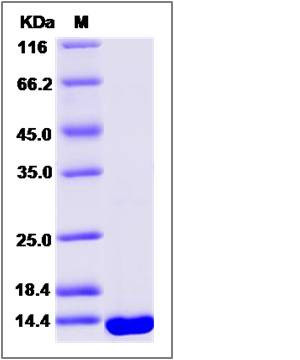Human PFN4 / Profilin 4 Protein (His Tag)
PFN4
- 100ug (NPP2398) Please inquiry
| Catalog Number | P15093-H07E |
|---|---|
| Organism Species | Human |
| Host | E. coli |
| Synonyms | PFN4 |
| Molecular Weight | The recombinant human PFN4 consists of 144 amino acids and predicts a molecular mass of 16.2 KDa. It migrates as an approximately 14 KDa band in SDS-PAGE under reducing conditions. |
| predicted N | His |
| SDS-PAGE |  |
| Purity | > 95 % as determined by SDS-PAGE |
| Protein Construction | A DNA sequence encoding the human PFN4 (NP_955378.1) (Met1-Ser129) was expressed with a polyhistide tag at the N-terminus. |
| Bio-activity | |
| Research Area | Immunology |Signal Transduction |Cytoskeleton / ECM |Cytoskeletal Proteins |Microfilaments |Actin etc | |
| Formulation | Lyophilized from sterile PBS, 200mM Arg, pH 7.4. 1. Normally 5 % - 8 % trehalose, mannitol and 0.01% Tween80 are added as protectants before lyophilization. Specific concentrations are included in the hardcopy of COA. |
| Background | PFN4, also known as profilin 4, is a member of the profilin family. Profilin can be detected in all eukaryotic organisms. It plays an important role in the spatially and temporally controlled growth of actin microfilaments. Profilin is one of the most abundant actin monomer binders, but proteins such as CAP and (in mammals) thymosin β4 have some functional overlaps with profilin. In contrast, ADF/cofilin has some properties that antagonize profilin action. PFN4 also functions in the dynamic turnover and restructuring of the actin cytoskeleton. |
| Reference |
